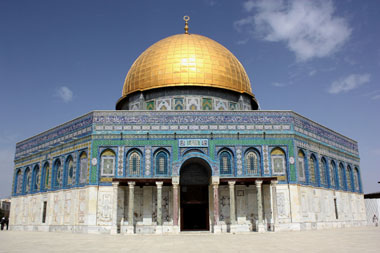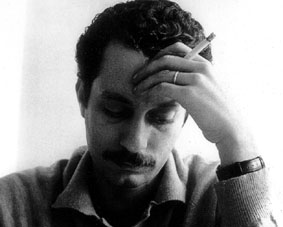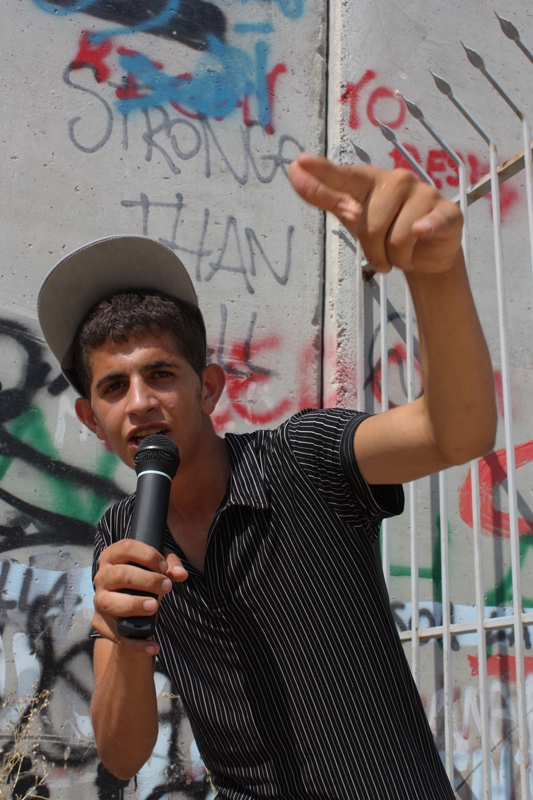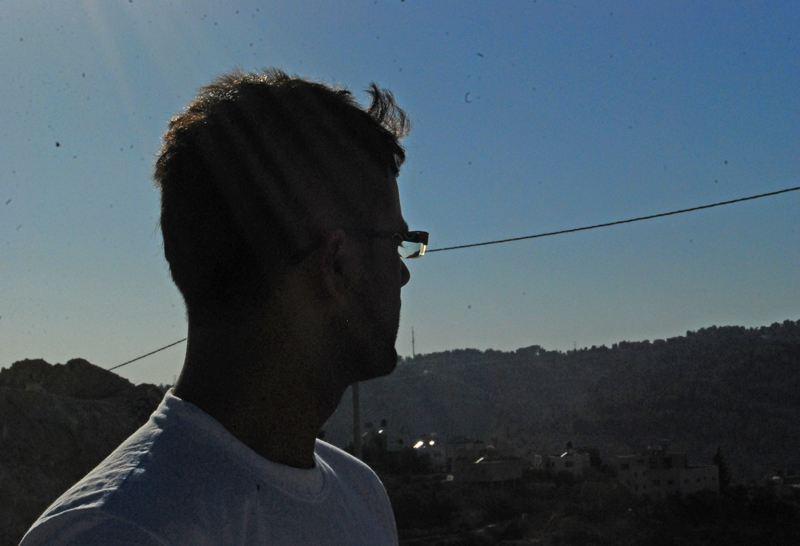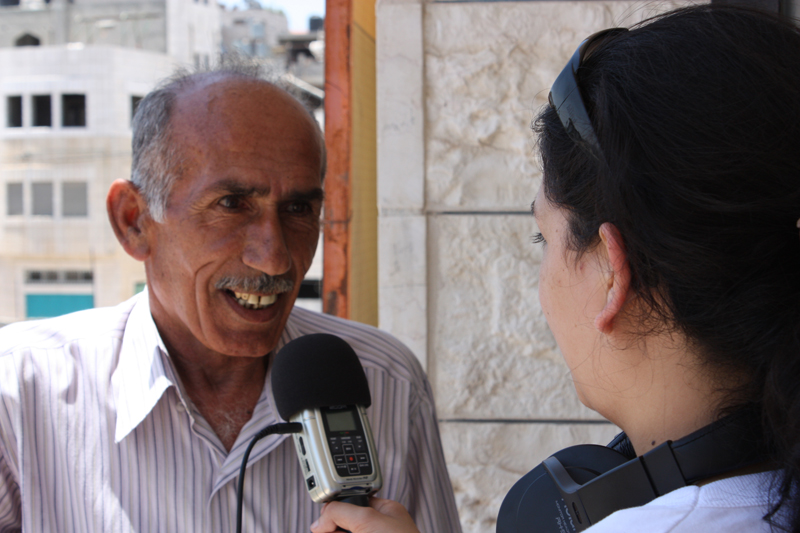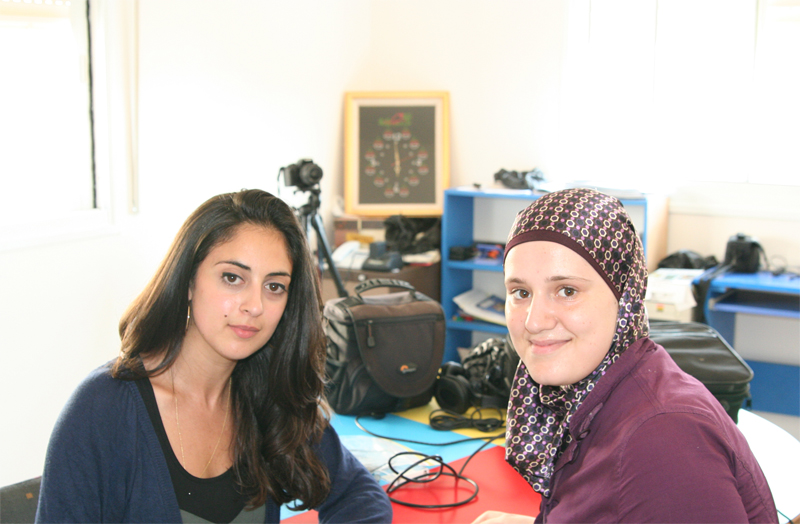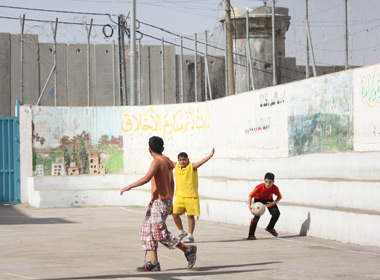In the last six months alone, 1,118 Palestinians have been arrested by Israeli soldiers. 90% of these individuals have been imprisoned.
It’s an extremely important issue that sadly affects everyone living in Palestine. If they haven’t spent time in jail themselves, their brother, sister, mother, father or cousin has. With that in mind, it won’t surprise you to know that many of the Lajee Center volunteers have also had this experience – including Radio Lajee’s Mohammad Qassim.
Although an extremely painful topic to talk about, the other night Mohammad decided to share his story. Please take the time to listen and learn.
OK. Hi everyone! Me and my friend Munjud will speak to you tonight. We will talk about the prisoner’s issue.
This issue hurts and affects one million Palestinian people from ’67 until now. And that means it affects each house in Palestine if not once, then twice in each house.
So this is a very, very important issue and very important case for you to know about. Now in Israeli jails there are 7,500 Palestinian prisoners – 340 are children under 18 years old. The children also stay in the same jails as young people because in Israel there is no special jail for children under 18 years old. In Israeli Law the Palestinian child is under 16 years old not 18 years old. The Israeli child is under 18 years old but the Palestinian child under Israeli Law is anyone who is under 16 years old.
I want to talk a little bit about the situation for young people and especially I want to talk about Aida Camp and our experience as children and young people living in Aida Camp – which is similar to most of the refugee camps in most of the areas of Palestine.
We grew up during the Intifada – the Second Intifada and we grew up under a hard situation. All of us were 13, 14 15, 16, 17 – when it started. And the only thing that we had grown up with was Occupation, bullets, people being killed, losing people from the family. Munjad he lost his father in 2001 he was killed in front of all his brothers and sisters when they were having breakfast he received a bullet in his head inside their house. Madjda he has four brothers arrested. Marwan’s two brothers have been in the jail. Me and my brother Ahood have been in the jail – he spent six years in the jail and I spent around 18 months in the jail. And also Marwan and my friends and most of the people from Aida Camp have these kind of sad stories.
We grew up in Aida Camp with this situation. And in The Camp, when we were children there was nothing to do in The Camp. Because there were no facilities, or at that time, organizations that work for children or young people. Just the only thing that we used to do, not to have fun but to change the normal routine, was the school. And they’re not really good schools, the United Nations Schools.
In 2003 / 2004, The Wall and most of this action started around this time. And Israel started also to arrest people and invade the cities. There is no real Law for Israel insisting to arrest people. Everything’s done by young soldiers without any laws or systems.
I want to talk about my experience when the soldiers’ arrested me. Usually the soldiers don’t arrest people in Palestine in the daytime, they use the nighttime. Especially after 1am in the morning.
My story is that on 19th January, 2006 at 3am in the morning, around 300 soldiers came to my house and I was sleeping at this time. My father came to the house and he asked me to wake up and he was shouting “Wake up, wake up! There are soldiers outside, they want you!”
I wake up, I was shocked like… I don’t get it. Soldiers…300…and that stuff…And I looked from the window and I saw many soldiers with black painting on their faces and shouting with their guns , “Come, come!” Which is “Bo, bo!” in Hebrew. And screaming…Shouting. I went outside of the house and it was the soldiers with M-16s… and lights and M-16s… I couldn’t see the soldiers. But, they talked to me and they said, “throw your ID.” I throw my ID to them and he looked at the ID and then he said something to the other soldiers and the soldiers catch me and they hand-cuff me behind my back. And my house is on the second floor and they throw me from the floor to down and they put me downstairs and they blindfolded me. Two soldiers catch me and they start running. And at that time I couldn’t run with them because I can’t see anything and my hands are behind my back. And I fell three times and my face, my hands – everything is blood because I fell with the running. And when we reach the jeeps they asked me to enter the jeep and the jeep was very high. I told them I couldn’t see anything to enter the jeep. Take the blindfold off and I can enter the jeep. He told me “Ok, wait.” And then four soldiers came and they left me and they threw me inside the jeep.
They put me on the floor of the jeep and I think around four soldiers – I didn’t count the legs – but I think around four soldiers, they put me on the floor and they sat on the chairs and all of them they put their legs on me and their M-16s and other guns. At that time I knew some of the words in Hebrew like shot and kill…Because most of the soldiers, they use it. And they were saying, “kill him” or “scare him” and these things. The two soldiers put the M-16’s to my head and they start talking. They start saying “shoot” or “kill” and these words. I don’t know exactly what they were saying but I imagine that they’re saying I want to kill him or I want to shoot him. I was really afraid. I told the soldiers, “please take the M-16 away or I will start doing with my head like this.” And one of the soldiers put his leg in my head and I stopped moving. All of them started using their legs and they pushed me on the floor of the jeep.
Then they took me to Rachel’s Tomb – it’s a military area close to the camp and they put me in the main road there. And like…after ten seconds everyone left me – they put me in the main road and they left me for five minutes. I was thinking, why? What will they do? Maybe they’ll throw me in Bethlehem and that’s it. They’ll throw me and they’ll leave me to wait. But, know many of these stories that have happened and I was thinking that they probably want me to escape so that they can shoot me. So, I prefer to stay still. After five to ten minutes the Israeli Military jeep came close to me and started to drive and to push me so that I fall down. And then stand-up and push me and drive and stop close to me. Not to push me like hard but to push me so that I fall down. And they do it three to four times. And after that the soldiers came and they left me again and they threw me inside the jeep. And then they took me to Gochachuan. It’s an Interrogation Center.
The first night they put me in an isolation cell. It’s small like one meter and a half by one meter. And it’s really dark. And they put me in for…I don’t know the time, I don’t know the time like how many hours were spent…But it was a long time. Maybe six or seven hours but it felt like two days. Because it’s a dark room and if you put your finger like this you cannot see anything. And after maybe six or seven hours the soldiers came.
We walked for fifteen minutes I don’t know where. And then they put me in an office and I waited in the office for around 30 minutes – something like that. And then two people entered the room and sat on the desk. And they asked the soldiers to hand-cuff me in the chair. And they hand-cuffed me to the chair like this; one hand here, one hand there, one leg here, one leg there. And you sit like this. And they started to ask me questions about my family, my sisters. Who did they marry / how many children do they have… Many personal questions. My friends – how many children do they have / what cars do they have? Lots of information. And then they started to ask me about things like, “they told me that you were throwing stones?” I said “no.” In reality, I was throwing stones to the soldiers, it’s something I’m proud of because I was resisting against the build of the wall in Aida Camp and fighting against the wall. I was throwing stones at the soldiers if not every day, day after day. But I said “no” – I cannot say “yes” because it’s an interrogation. But after that he said, “You say you don’t throw stones, but I know that you throw stones, you throw cocktails and you throw hand grenades and you have guns, you have weapons and lots of things.” I started to think in my mind, from where did he get…from where, all of this? And he told me, “You want to sign this paper. Saying you’ve done all these things.” I told him, “I cannot sign it because I didn’t do it.” He told me, “Look, if you sign it or don’t sign it – we have Tamer Law.” Tamer Law says anyone who’s Palestinian if they say something about you that you’ve done against Israel they can judge you up against what’s been said about you, not what you’ve said or done. He told me that you have to sign, you have to sign -I told him “no.” He brought two people, they’re like two buildings. Big, big, big people. And one stood here and one stood there. He told me, “if you don’t say what I…if you don’t sign this paper and fingerprint this paper, I will leave them to beat you. But I’ll leave the room for a while and then return.”
They spend like…negotiate me to sign this paper for 2 hours and then they left. And he asked the soldiers to make the hand-cuffs down. They take a small chair like this and you sit like this and they put your hands here and here and legs there. And you feel like the banana. They make you like a banana. And they left me for two hours. After two hours I can not feel my body. I can not feel my body like I don’t… And at that time I say, it’s good. When I can’t feel my body I’m thinking it’s good because if the two big people if they beat me now, I won’t feel it. If they beat me I won’t feel it. And then after two hours they entered the room. And he said, “did you think about what we told you?” I told him, “yes.” He said, “Well, what did you decide?” I told him, “no, I didn’t do anything.” He has a picture of Aida Camp and of Bethlehem – the Nativity Church, and the market, the central market in Bethlehem. He said, “Look at these two pictures.” I looked at the two pictures. “Do you know these places?” I told him, “Yes. This is Aida Camp and this is Bethlehem.” He told me, “You will miss these areas for five years.” I asked him, “Why?” He said, “I will let you stay in the jail for five years if you don’t sign this paper.” I told him, “I cannot sign this paper.” And he slapped me. Then he asked the soldiers to hand-cuff me with the plastic. The plastic, the plastic if you move or…If you move, it feels really sharp. And they do it like…The plastic touch feels like a burn. He told me, “You have to do it now!” And after an hour…at that time after an hour of beating and playing with the hand-cuffs and these things, I was going to say it. They stopped beating me the moment that I decided to sign. Really, they stopped the very moment that I decided to sign. And he started to negotiate with me. He said, “Look, choose four of these things and that’s it. And we’ll make a new paper. Just choose four. I don’t want you to choose the eight. Choose four of them. What do you want? What you want to choose, choose. And we will write it on paper, and that’s it. We will judge you for that.” I told him, “I cannot choose.” Like if I say…Because I know that if I say I used a gun, I have to bring the gun, I told him. And I don’t have a gun. “How can I bring you a gun if I don’t have it?” And he said, “No. Just sign it we won’t ask you for the gun or anything. Just sign it and that’s it.” We spent around – I don’t know, around six or eight hours I’m not sure. And then he said “Look, I have a friend who said you have done some of these things and I can judge you under Emergency Law and Tamer Law, for this reason.” So I said, “put me in the jail.” Then they sent me to the room with other Palestinians. The room was around 4 metres by 4 metres and there were 18 of us inside the room. We used to sleep inside the room on our sides because there is not enough space to sleep properly. And the food they were giving us- this was the first meal I had had in 2 days, I only had a little bit of water before that- was rice, eggs, soup and something else which I didn’t know, all mixed together. They gave us the food and all the prisoners who had been in here longer than me, for 9 days, 10 days, told me to eat. I told them I could not eat it because it was all mixed together, how could I eat it? I told them I’d prefer to eat some bread and drink some water. I preferred to eat the yogurt which was a small amount, no more than half a plastic cup for each person for breakfast. I used to eat a piece of bread, this yogurt and some salt to keep my stomach good. I did this for around 14, maybe 15-16 days. I was 88 kilos when I went to Awthar jail and after 16 days I was 74 kilos.
After you get out of the interrogation there is a police station where they take all 10 fingerprints and they ask you again the same questions, but they don’t interrogate you. They ask you the same questions without interrogation. After that they sent me to jail and after a week in jail a soldier took me to the court. I was happy to go to the court, I was very happy. I was smiling, I hadn’t said anything in the interrogation. I thought I would be released, that it was just bullshit what the interrogator was telling about the laws just to scare me into signing the paper. When I went to the court I was happy, the Palestinian lawyer came and he said “You are Mohammad?”. I told him “Yes”. I was very happy that a Palestinian lawyer came to the hearing. He told me “Look, what I am about to tell you will shock you, but you have to understand it very well. There is no justice in the court; it is a military court. There is no real court but we can have deals in the court.” I didn’t get it. This was the first time I heard about this sort of thing. What did he mean “deal”? The thing I knew about courts was lawyers, people saying what they have done, being judged, that kind of thing. I told him “No, I heard some stories that Israelis bring Israeli lawyers to interrogate Palestinians” and that I was scared. I asked him to change the date of the court hearing and I went back to the jail again. They postponed it for 3 months and my family sent a lawyer to Awthar jail. He was a Palestinian and told me that he was on my family’s side. He told me that the other lawyer was a Palestinian too and explained a little bit about the court to me.
When I went to court after 3 months he told me “Look, the deal is what we have. If you don’t want to sign the paper and to say this, they will give you 5 years.” I remembered what the interrogator told me. “But if you sign this paper and stand at the court and tell the judge you did all these things, he will give you 18 months”. He gave me an hour to think about it and I thought about it: they are in power, they can give me 5 years, or I can stand in the court and say “I did it” and get 18 months. It’s better than 5 years. I stood in the court and he started to name the charges that the interrogator had mentioned and he asked me “Did you do all these things?”. I stopped for about 10 seconds and then the lawyer told me to say it. I said “Yes, I did all these things”. He told me to sit back down and then lawyer came to me again. He told me “I can reduce your sentence to a year. There is a law in the court- they can give you 6 months less than the judgement if you stand in the court and say ‘I ask for mercy from the Israeli state’”. That is something that is not acceptable to me. I told him if they sentence me now for 5 years it’s better than to stand in the court and ask for mercy. I never ask for mercy from occupation. It’s something I cannot do. I was a child, I was young at that time, but my national identity, my national belief, pushes me to not ask for mercy from the occupation even if they kill me. That’s my belief.
There is around 25 jails in Israel. Two jails are Awthar and Nakab and Nakab is the biggest jail. The area is called the Negev now, because it’s the Negev desert in Hebrew but the original name is Al-Nakab. The jail is made of tents and there is a wall like the apartheid wall around all the tents and you can only see the sky. Everything is the same color in the jail- the tents, the floor, the wall- everything the same color. You see, if you stay for one year in the jail and you go out the jail, you cannot look. The first time you go out and look you start to look and you must close your eyes. Because you see only one color in the jail and in the night you cannot see the sky because the light is so hard and strong that you cannot look at the lights. I don’t want to make my story too long but I want to talk about another story for 2 minutes.
My brother was in the jail for six years. I didn’t see him for six years. He was in Nakab Jail I was in Awthar Jail. He was arrested when he was 16 years old – I didn’t see him for six years. So when the soldiers came to tell me I was moving to Al Nakab I knew that my brother was in Nakab and I was happy to meet him. Marwan came with me in the same bus to Al Nakab. At that time all I could think of on the four hour journey from Awthar to Nakab was that I didn’t know what my brother looked like now. Would I remember him or not? This kind of stuff… So when we reached the jail I stopped. Marwan asked me, “why did you stop?” I told him, “look if I enter the section now and I don’t know my brother I will be destroyed – I will die.” He told me, “think about something else.” I told him, “look I will make a problem with the soldiers now and you will go to the section with the bags and find out who my brother is and come back and tell me who he is.” So I created a problem with the soldiers, “Why are you looking at me like this? Don’t push me” and stuff like this…It worked. We had a problem they stopped me for five minutes and Marwan when he was putting the bags down saw my brother but he couldn’t come back. So the only way he could come back was to make a problem with the soldiers. So Marwan made another problem with the soldiers and they put us in a small room where they beat us and he told me I saw your brother, he’s wearing a green T-shirt. I was happy – I thought I know my brother now.
The first time I entered the section, I saw my brother standing, I didn’t really recognize his face but I was looking at the T-shirt not his face. The first time I saw him I started to cry. I cried because I hadn’t seen him in six years and I didn’t know him and the beautiful place that I met him – in the jail after six years. I spent four months in the jail and that wasn’t anything. For me, something small but for me it means a lot. And when I was released from the jail all the guys – all these guys – they were with me. 25 of them from Aida Camp from the same section – 25 from the same class in the school. And they spent all the night with me because it was my last night in the jail and the door of the jail it’s…you can see what’s outside. And I went out, I was walking and I said goodbye. And they opened the gate of the door and all the prisoner’s can see and all the guys were standing. And I went out of the gate and I heard them yell “how’s the freedom?” Well, I stood like this but I didn’t look at them. It really shocked me. How I was feeling was happy but I felt like I had left 25 parts of my body inside the jail. It really affected me – I started to cry. I was happy but when they said it, I started to cry. I didn’t look at them, I was sad. I started running to the jeep.
